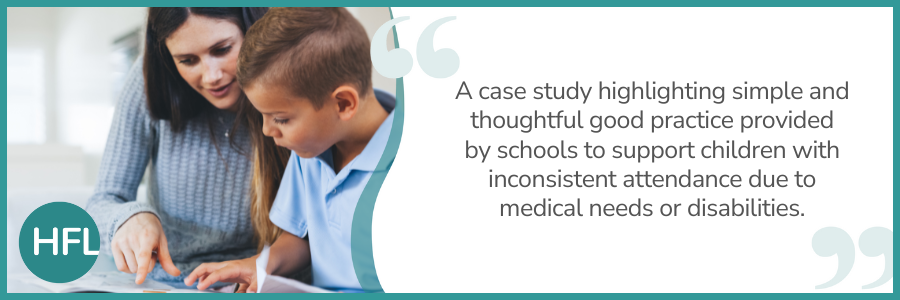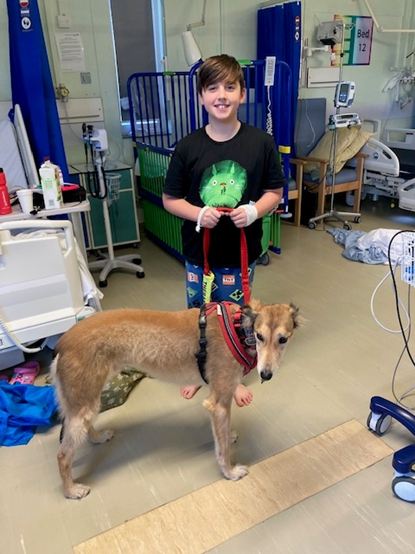
The current focus on attendance is on reducing the number of days lost to absence and getting children into school more. Labels such as ‘persistent’ or ‘severe’ absence are based on a number (90% and 50% attendance respectively). And from recent media articles you could be forgiven for thinking that behind every child with poor attendance “parents are colluding with truant pupils and fuelling chronic absenteeism”. (The Times, May 6, 2024).
But, for some children with ongoing or complex medical needs or disabilities, the reality is that variable attendance may just be a part of life; for them the conversation needs to move on. Behind the headlines are individual children and we need to provide support that ensures the best possible learning and outcomes, despite the challenges of inconsistent attendance.
This blog is not a how-to guide, although I will reference some useful guidance at the end. I have chosen to share this personal story because I believe that this is how we will best support attendance in school – by personally getting to know, understand and be alongside each child and their family. My hope is that our family’s lived experience might be useful.
When I mentioned this blog, my son, Finn, said “I can tell you what you should write”. So, this is our joint effort to share some simple but thoughtful practice from both his primary and secondary schools. Ours is a positive story, although I am aware from many parents that I meet in hospital that this is not consistently the case. We are grateful for the kindness and understanding that his schools have given us which has allowed Finn, despite his medical needs, to do his best and succeed at school.
Finn is 11 years old, in Year 7 and loves football, gaming and learning Spanish. In the last six years he has had ten operations, several hospital stays and inconsistent attendance. Year 7 has been a ‘good’ year for him - to date his attendance is 88% which still labels him as ‘persistently absent’ but is a huge improvement on last year’s 70%.
Relationships are everything
Having a robust attendance policy is an essential starting point but it is relationships that make the difference. Checking in after an absence reminds a child that they belong: “Welcome back, we missed you” re-establishes a personal connection. Not acknowledging a period of absence can make a child feel invisible or even unwanted. Finn says: “Good questions for teachers to ask are:
“Are you feeling ok? Is there anything you need?”
If a child’s been absent for a while, then having someone available to share their time away from school may be helpful. A hospital stay is a significant life event, and for Finn, being able to discuss his experiences - being in an MRI scanner, meeting the hospital dog Zanzibar and getting his first hearing aids - was important. Finn’s teachers knew him well and made sure there was time to do this with adults and with his peers even though sharing an MRI image of your brain is a little unconventional for show and tell!
For many children having an operation the Friday before Year 6 SATS would have been a welcome excuse not to take them. But for Finn,
“I know that SATs aren’t that important but I wanted to do them, I didn’t want to miss them out. It made me feel like they cared – that’s important.”
His SENCO saw how he felt, and the school went above and beyond arranging for the SATS to be invigilated at home – signalling to Finn that his learning and his opinions mattered. She even brought him his cupcake and arranged a video call so that he could join in the end of SATs celebrations with his classmates. I know this kindness was not logistically easy; for Finn, the impact was beyond measure.
Illness is tiring
We’re asking children to return when they’re ‘well enough’ to be in school even if they’re not 100% well, so we need to understand that they might not be able to ‘bounce back’ to coping with a full school day.
“I want the teachers to know what’s going on, so they will listen if I ask for a break or ask for help. Sometimes I still feel in pain even when I’m back at school. Sometimes it’s hard to put up my hand and say it myself, so I like it when a teacher checks in with me”
Any reasonable adjustments that can reduce the cognitive load and physical fatigue, such as having a quiet space at lunchtime, more frequent brain breaks, providing more scaffolding and support than usual, or reducing homework expectations may help a child to cope better on their return to school, and make a relapse less likely. Recuperation is often not linear, so be flexible enough to change the plan depending on whether the child is having a good or not-so-good day.
Illness is stressful for families
As well as worry for their child’s health, parents are often worried about the impact on siblings and trying to juggle work commitments. I still have the message from Finn’s headteacher after a particularly difficult operation “we are all here for you and will do all we can to support you through this”; that one expression of kindness and empathy cemented me as a cheerleader for his school for life.
Being in hospital with a child is a strange, institutionalised experience where you are physically with your child 24/7, hypervigilant, constantly looking out for tiny signs of improvement or deterioration. To entrust your child back into the world again is scary. I was reassured by a post-op meeting with Finn’s class teacher to jointly create a risk assessment – open questions such as “what are you worried about?”, “what do you want me to do if…?” “what will he say if he’s getting worse?” gave me the chance to share concerns and feel confident that he would be safe to return.
What learning have I missed?
What systems do you have in place for supporting children to catch up with missed learning? After Finn had been away for a few weeks, sometimes he’d just need some context for the upcoming lesson – some 1:1 pre-teaching with a TA, showing previous videos or slide decks, or discussing with a peer.
“I was never uncomfortable talking about why I wasn’t in school, but some people might not want to talk about it, so even a quick little recap – look back in your partner’s book would help without it being a massive deal”.
Whilst this could not fully compensate for the experience of the missed lesson, it provided a bridge to give him enough knowledge and confidence to be part of and access the next lesson.
Understanding the curriculum well enough to identify what is ‘essential’ knowledge that a child will need as a foundation for future learning, will help you prioritise what ‘missed’ learning must be caught up on. If spaced practice is routinely built into your planning, then learning gaps can be identified; during a retrieval quiz in maths, the class teacher realised that Finn had been absent for ‘mean, median and mode’ and was able to plug this gap.
Perhaps the most important thing is to establish a relationship and a trust where a child knows they have the agency to say: “I don’t understand; I think I’ve missed this”. Some children may benefit from a ‘help’ card or to rehearse a script to support them in asking for help.
Watch out for unintended consequences
Ongoing illness has had at times a significant impact on Finn’s self-esteem; periods where he felt it was ‘unfair’ that he had to deal with medical conditions were exacerbated by the unintended consequences of some school policies. As a mum, I had to reiterate termly that 100% attendance certificates were about luck; it was just bad luck and not his fault that he would never receive one.
“I really don’t like attendance awards, because for a lot of people you can’t help missing weeks of school. And it’s not even about the award, it highlights the fact that you’ve missed out. It makes you feel excluded for something you can’t help”.
A recent assembly describing the statistical link between children with poor attendance and poor exam results and job prospects did not have the motivating effect intended; it just made Finn feel like giving up altogether. I reassured him that, for example, the resilience and patience that he has learnt whilst coping with illness are transferable skills that will help him in the future.
And if I had a magic wand, I would get rid of the standard, one-size fits all letter to inform you that your child’s attendance continues to remain unsatisfactory. A recent letter requested my support in “ensuring that Finn maximises his school attendance achieving the school’s target” – it’s sadly not realistic to expect that Finn will ever have a school year where he reaches 95%.
I appreciate that formal letters can serve a purpose if they have the intended impact. Receiving this letter nearly undermined the positive personalised support we have received from individual staff members; I felt judged, failing as a parent and frustrated that Finn was being criticised for a number which actually reflects a huge improvement in his health and attendance! The DfE guidance recommends:
“In all cases, schools should be sensitive and avoid stigmatising pupils and parents and they should talk to pupils and parents and understand how they feel and what they think would help improve their attendance to develop individual approaches that meet an individual pupil’s specific needs.”
Emphasising the individual approach implies that a range of template letters with standard phrases that could be adapted to reflect an individual child’s specific needs may be more helpful.
Top Tips
As we come towards the end of the school year, here are three things for you to consider as you get ready to support your new cohort:
1) Find out the story behind the numbers, so that parents don’t have to repeat the basics. Familiarise yourself with any written plans such as the Individual Health Care Plan or SEND documentation (SEN support plan or Education, Health and Care Plan).
2) Don’t make assumptions based on what you think you know about a medical condition or disability - establish a relationship with both the parents and child and ask questions to understand what their experience has been. Listen carefully and be flexible about the support you offer – needs may change as the child gets older.
3) Be aware of potential learning gaps throughout the year– both when the child was absent, but also where the child was physically present but too fatigued or in pain to effectively learn. Explain that you understand and expect this: give children permission to advocate for themselves. “I know that there will be gaps as you missed a lot of school last year, so do ask if you’re unsure at the start of a new topic or if you need a bit more support.” For older children, as you revisit a topic that builds on previous learning, providing prompts such as “You could watch this video refresher to see how much you remember” might be useful.
Finn and I hope that this blog has reminded you to focus on more than just the number. Do I think that this supportive practice has led to an improvement in his attendance percentage? This may not be the answer that schools are looking for, but probably not. But I am certain that the care he has received has had a positive impact on his learning outcomes and his social and emotional development. Finn’s final advice for any child going through a similar situation:
“If you have any issues, make sure you talk to a teacher and let them know what’s going on. They need to know if you’re unwell as it will be hard to learn properly. It’s ok to ask for help even if you feel a bit awkward doing it”

For further information to support children with medical conditions and attendance, please see:
DfE: Supporting pupils at school with medical conditions
DfE: Working together to improve school attendance
In Hertfordshire please see HCC attendance guidance on the Grid website.



